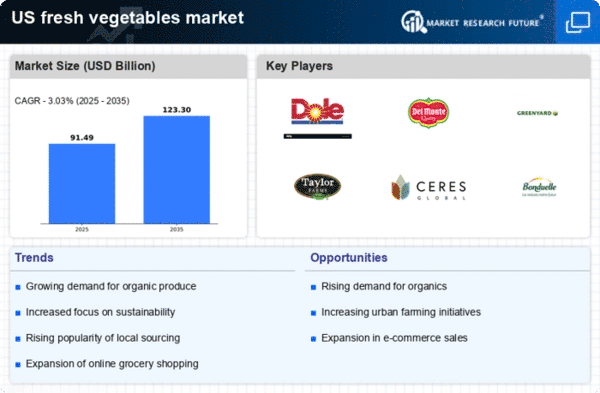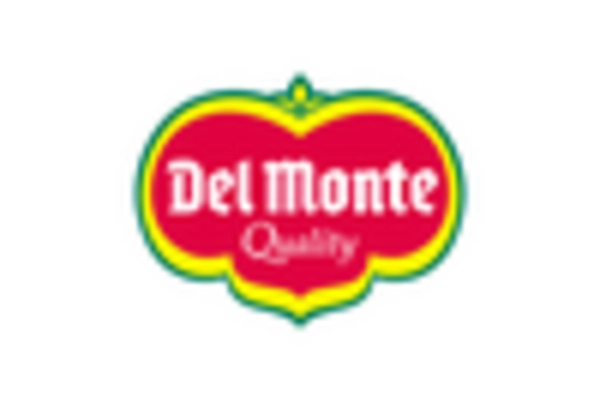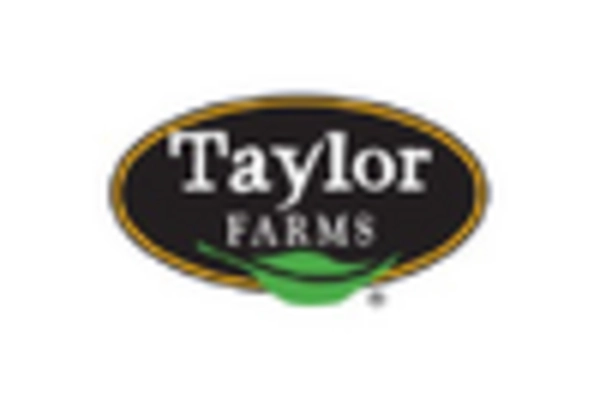Sustainability Initiatives
Sustainability has emerged as a critical driver in the fresh vegetables market, influencing both consumer choices and industry practices. Many consumers are increasingly concerned about the environmental impact of their food sources, leading to a preference for sustainably grown vegetables. The fresh vegetables market is responding by adopting eco-friendly farming practices, which may include reduced pesticide use and water conservation techniques. Reports indicate that around 60% of consumers are willing to pay a premium for sustainably sourced produce. This trend not only supports environmental goals but also enhances brand loyalty among consumers who prioritize sustainability in their purchasing decisions. As the market evolves, sustainability initiatives are likely to play a significant role in shaping the future landscape of the fresh vegetables market.
E-commerce Growth in Food Retail
The rapid expansion of e-commerce platforms has significantly transformed the fresh vegetables market. With the convenience of online shopping, consumers are increasingly purchasing fresh produce through digital channels. Recent statistics suggest that online grocery sales in the US have grown by over 30% in the past year, with fresh vegetables being a key category. This shift towards e-commerce is reshaping the fresh vegetables market, as retailers adapt their strategies to meet the demands of tech-savvy consumers. Enhanced delivery options and subscription services are becoming more prevalent, allowing consumers to access fresh vegetables with greater ease. As this trend continues, it is likely to drive further innovation in logistics and supply chain management within the fresh vegetables market.
Government Support for Agriculture
Government initiatives aimed at supporting the agricultural sector are playing a crucial role in the fresh vegetables market. Various programs and subsidies are designed to promote the cultivation of fresh produce, thereby enhancing supply and stabilizing prices. The fresh vegetables market benefits from these policies, which may include funding for research and development, as well as incentives for sustainable farming practices. Recent reports indicate that government support has led to a 15% increase in the production of fresh vegetables over the past five years. This backing not only bolsters the market but also encourages innovation and competitiveness among producers, ultimately benefiting consumers with a wider variety of fresh vegetable options.
Health Consciousness Among Consumers
The increasing awareness of health and wellness among consumers appears to be a pivotal driver for the fresh vegetables market. As individuals prioritize nutritious diets, the demand for fresh vegetables has surged. According to recent data, approximately 70% of consumers in the US actively seek out fresh produce, reflecting a shift towards healthier eating habits. This trend is likely to continue, as more people recognize the benefits of incorporating fresh vegetables into their daily meals. The fresh vegetables market is thus experiencing a notable uptick in sales, with organic and locally sourced options gaining particular traction. This heightened focus on health may also lead to innovations in product offerings, as companies strive to meet the evolving preferences of health-conscious consumers.
Urbanization and Changing Lifestyles
Urbanization is a significant factor influencing the fresh vegetables market, as more individuals move to urban areas and adopt fast-paced lifestyles. This demographic shift has led to an increased demand for convenient and ready-to-eat fresh vegetable options. The fresh vegetables market is responding by offering pre-packaged salads and vegetable mixes that cater to busy consumers. Data indicates that urban consumers are 25% more likely to purchase fresh vegetables compared to their rural counterparts, highlighting the importance of convenience in urban settings. As urbanization continues, the fresh vegetables market is expected to evolve, with a focus on products that align with the lifestyles of city dwellers.
















